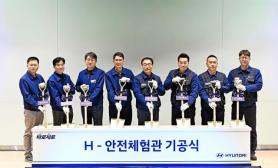
[Courtesy of Hyundai Motor]
SEOUL -- The US Treasury Department has sidelined Hyundai and Kia's electric vehicles from the list of 16 EVs that are eligible for the United States federal tax credit of up to $7,500, which branches out from the Inflation Reduction Act that was signed into law in 2022.
The exclusion cast a dark cloud over the South Korean carmakers as their products lost competitiveness in the North American EV market which is growing at an average annual growth rate of about 37 percent to reach $147 billion by 2028.
When the Inflation Reduction Act (IRA) first took effect in August 2022, the United States required carmakers to add the final assembly process in American soil in order to receive the tax credits. Hyundai and Kia's EVs were eligible for the subsidies back then, along with a total of some 40 EV models.
However, new strengthened requirements that mandated car companies to receive tax credits of $3,750 by assembling their vehicles on US soil using more than 50 percent of battery parts that were manufactured and assembled in the U.S. Another tax credit of $3,750 will be given to automotive companies that use more than 40 percent of key materials produced in the U.S. or other countries that have signed free trade agreements with America.
According to the U.S. Internal Revenue Service, the main body for collecting federal taxes, on April 18, companies who are eligible for a full tax credit of 7,500 are -- Cadillac, Chevrolet, Chrysler, Ford, Lincoln, and Tesla. No foreign carmakers were on the list of tax-supported EV makers. Japanese carmaker Nissan has two EV manufacturing plants in the U.S. but the company was excluded from the list of EV makers that would receive full tax credits.
In a bid to meet the new requirements for tax credits for EVs, Hyundai and Kia are currently constructing a manufacturing plant for EVs and batteries in Georgia by 2025.
Copyright ⓒ Aju Press All rights reserved.




